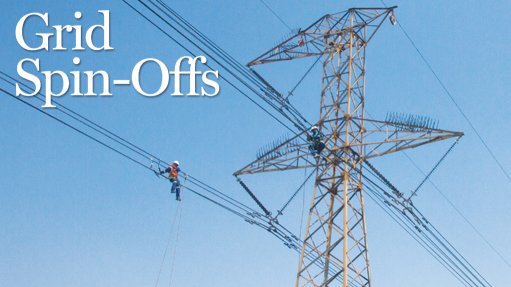Public Works to blacklist ‘criminal’ contractors as delayed projects soar to R3-billion
Out of the 206 infrastructure projects overseen by the Department of Public Works and Infrastructure (DPWI) this financial year, 164 are experiencing delays, says Public Works and Infrastructure Minister Dean Macpherson.
Addressing Parliament this month, he said this represented a 79% delay rate across the department’s portfolio for this financial year.
“The financial toll alone is substantial, with an estimated R1.3-billion already invested in projects in this financial year that are yet to reach completion.
Over several financial years, the number jumps to R2.9-billion in delayed construction projects.”
Macpherson regards these delayed construction sites as crime scenes.
“Individuals have been paid for work they have not completed. It results in half- finished buildings, idle construction sites, and, most importantly, wasted public funds.”
Macpherson said one such example was the Telkom Towers project in Tshwane, where around R1-billion was spent on upgrades over ten years, with little to show for this expenditure.
“The complex, intended to become the South African Police Service headquarters, still has the Telkom sign in front of the building.
To avoid further waste of public finances, we are now exploring options to either repurpose this asset or remove it from our portfolio altogether, with an independent investigation under way.”
To reverse the trend of unfinished construction projects, Macpherson said his department would implement “several drastic measures” to overhaul the way it managed and executed projects.
“Going forward, contractors who do not meet their obligations on time and within budget will face immediate repercussions, including blacklisting.
Contractors who underperform or engage in noncompliant practices will no longer have the privilege of working on public projects.”
Working through the Construction Industry Development Board, the DPWI will also ensure that only contractors of the appropriate size and adequate level of expertise will be awarded large construction projects.
“In conjunction with this, we are enforcing new regulations for tender evaluation to ensure transparency and accountability,” said Macpherson.
“By adopting a public-facing system that records the tender process, we are committing to openness in contractor selection.
“Moving forward, audio and video recordings will provide a transparent view of how decisions are made, which will prevent any bias or irregularity in the awarding of contracts.”
The DPWI will also empower the Council for the Built Environment to set mandatory standards across the construction sector.
“We believe this measure will ensure that only qualified, accountable professionals are entrusted with our nation’s infrastructure projects.”
Meanwhile, Macpherson said the DWPI would create a Contract Management Unit, which would monitor contractor performance to ensure projects adhered to budgetary and time constraints.
“By centralising contract oversight, we will identify potential issues early, implement corrective actions, and hold contractors accountable at every phase of a project.”
The DPWI is also developing a pre-approved panel of contractors with demonstrable capacity to complete projects on time and within budget.
“This panel of contractors will also serve as an intervention unit to finish incomplete projects,” said Macpherson.
However, the challenge of delays did not rest solely with contractors, warned Macpherson.
“We have seen that client departments often contribute to these delays by withholding payments to contractors, which disrupts project timelines.
“We are addressing this by establishing payment protocols to ensure client departments meet their financial obligations promptly.
Moreover, the R14-billion owed to us by user departments must be paid, or else we will be forced to start treating government departments as debtors and apply debtor policies, which may include debt collection and eviction.”
Article Enquiry
Email Article
Save Article
Feedback
To advertise email advertising@creamermedia.co.za or click here
Press Office
Announcements
What's On
Subscribe to improve your user experience...
Option 1 (equivalent of R125 a month):
Receive a weekly copy of Creamer Media's Engineering News & Mining Weekly magazine
(print copy for those in South Africa and e-magazine for those outside of South Africa)
Receive daily email newsletters
Access to full search results
Access archive of magazine back copies
Access to Projects in Progress
Access to ONE Research Report of your choice in PDF format
Option 2 (equivalent of R375 a month):
All benefits from Option 1
PLUS
Access to Creamer Media's Research Channel Africa for ALL Research Reports, in PDF format, on various industrial and mining sectors
including Electricity; Water; Energy Transition; Hydrogen; Roads, Rail and Ports; Coal; Gold; Platinum; Battery Metals; etc.
Already a subscriber?
Forgotten your password?
Receive weekly copy of Creamer Media's Engineering News & Mining Weekly magazine (print copy for those in South Africa and e-magazine for those outside of South Africa)
➕
Recieve daily email newsletters
➕
Access to full search results
➕
Access archive of magazine back copies
➕
Access to Projects in Progress
➕
Access to ONE Research Report of your choice in PDF format
RESEARCH CHANNEL AFRICA
R4500 (equivalent of R375 a month)
SUBSCRIBEAll benefits from Option 1
➕
Access to Creamer Media's Research Channel Africa for ALL Research Reports on various industrial and mining sectors, in PDF format, including on:
Electricity
➕
Water
➕
Energy Transition
➕
Hydrogen
➕
Roads, Rail and Ports
➕
Coal
➕
Gold
➕
Platinum
➕
Battery Metals
➕
etc.
Receive all benefits from Option 1 or Option 2 delivered to numerous people at your company
➕
Multiple User names and Passwords for simultaneous log-ins
➕
Intranet integration access to all in your organisation


















